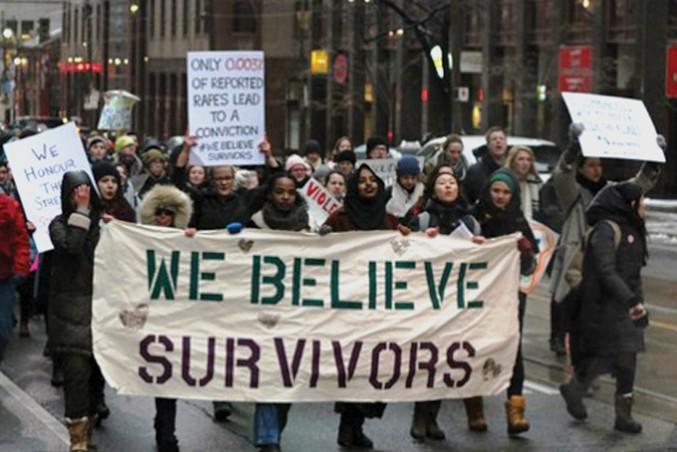By Emily Theodore
Donald Trump’s presidency win has changed the scope of sexual assault culture as discussed at the Is There A Rape Culture in Canada? panel held at Ryerson University on Nov. 9, 2016.
“In the talk I … was going to quickly engage in the concept of rape culture in Canada,” said Brenda Cossman, a law professor at the University of Toronto. “But the thing is … an alleged rapist, an admitted serial sexual assaulter, has just been elected to be the president of the United States of America.”
Cossman defined her interpretation of rape culture: the pervasiveness and normalization of sexual violence, blaming the victim, sexually explicit joking, tolerating sexual harassment, defining manhood as dominant and sexually aggressive and refusing to take rape accusations seriously because “women lie.” “This is a page of Donald Trump’s campaign strategy.”
“This is what he has done over and over again. It’s how he’s behaved. It’s how he’s responded to the ‘grab her by the pussy’ video,” Cossman said. “It’s how he’s responded to the … 15 women … who accused him of sexual assault. He has denied and mocked their appearances.”
Trump has threatened minorities, Blacks, Muslims, the LGBTQ community, undocumented workers, refugees, abortion rights, gun control, health care and democracy. She said the worst thing about this man, this “vile … uninformed and hateful man,” is the backward, racist, sexist and discriminatory example he leads.
“A New Yorker columnist … called it an American tragedy,” Cossman said. “It is really hard to even begin to engage in academic and political conversation in a new era of what is now post factual and post empathy politics. If we now live in a world where facts don’t matter, and people don’t matter, I don’t even know how I can begin to talk about any of the work that I do. I’m shaken to my core because I’ve spent a lifetime dedicated to the power of education.”
Ummni Khan, a law professor at Carleton University and panelist, connected how racist and targeting undertones—like the one’s Trump boldly declares—embody the term “rape culture.”
“In music, the people who get targeted are Black men … Hundreds of cases document rape lyrics as the main evidence to convict people of murder, drugs and assault,” Khan said. “Why is it that music produced by Black men seem more threatening to us?”
Khan says that cissexist and heteronormative ideals are also weaved into rape culture by its very definition.
“Rape was the ultimate crime against a woman, but it was only something a man could do to a woman … We want to move away from the idea that penetration is the ‘thing.’ It covers a lot but has a very archaic origin,” she said. “[I’m] worried about the lack of intersectionality that this term brings up. You overlook … the trans, queer, gay, etc., [those] vulnerable to false accusations of sexual violence.”
Intersectionality isn’t a buzzword. “It’s easy to attack the feminist who is already feeling uncomfortable … it’s easier to attack them as opposed to someone like Trump,” Khan said. “It’s easier to attack people who are different from you.”
Lara Karaian, a panelist and professor of criminology at Carleton University, said society needs to check the oppression in the term.
“It’s imprecise [and] lacking in nuance … it prioritizes sex at the expense of other violence,” said Karaian. “Intersectionality has to be at the forefront. It’s not that queer individuals are more affected, but they’re affected differently.”
According to the Canadian Mental Health Association, LGBTQ individuals may experience multiple forms of marginalization at the same time. An Ontario-based study of trans people found that 20 per cent had experienced physical or sexual assault due to their identity.
In the wake of the new American president who wants to ban abortion, Cossman and Karaian mentioned the sex panics that are embedded in our society.
“[Sex] is seen to be inherently harmful … and needs to be contained. We need to think about the way we’ve thought about sex as harmful … for literally 150 years,” Cossman said.
Sexual minorities endure the objectifying rhetoric that is still ever-present online, with no help from Trump’s slamming tweets and “locker room banter.”
“There is a particularly gendered nature to trolling that is deeply problematic,” she said. “As long as sex itself remains shameful and stigmatized, women and other sexual minorities will be shamed and stigmatized by it.”
“[There’s] nothing fucking wrong with being provocative,” Karaian said. “What’s wrong is … passed out, non-consensual rape.”













Leave a Reply